Necrotizing enterocolitis in the newborn: FDA goes after probiotics while ignoring problems caused by vaccines.
Edited November 18, 2023
This article was originally published on Friday, November 17, 2023. It has been edited in response to comments received on the original post.
On October 26, 2023, the United States FDA sent out a News Release raising concerns about the use of probiotics in preterm infants in the NICU setting, claiming that the use of probiotics as a preventive or treatment for necrotizing enterocolitis has resulted in one death and “more than two dozen other reported adverse events in the United States since 2018.”
The Cleveland Clinic has this to say about necrotizing enterocolitis:
“Premature babies are at risk for necrotizing enterocolitis (NEC). The condition causes intestinal tissue to die. It can also cause a hole in the intestine. Bacteria can leak through this hole, causing serious abdominal infections. Switching to IV feedings can help. Some infants need surgery to remove the damaged intestine.” (source)
Over the course of my clinical career, in which have worked with families of children diagnosed with autism and other neurodevelopmental disorders, I have had a few clients who have endured necrotizing enterocolitis in infancy and who were later diagnosed with autism. I also know that probiotics have been one of the most effective biomedical interventions for children diagnosed with autism spectrum disorders, a great many of whom also suffer from gastrointestinal disorders. Constipation and diarrhea are extremely common among people diagnosed with autism. Addressing gut health through diet and supplements (including probiotics and prebiotics) is a cornerstone of interventions to improve overall wellness.
In multiple instances, including in children who were born very premature, parents have told me their children were doing well in the NICU until they received their first round of infant vaccinations, which are routinely given to babies born months prior to their due date, as if they are exactly the same as babies who are born full-term.
When I first saw the announcement about the FDA’s warning regarding probiotics, it was in a Facebook feed and the article was from MedPageToday.
While reading through the MedPageToday article, I noticed that while warning against probiotics, they were simultaneously promoting the newly licensed Prevnar 20 vaccine for infants.
That got me wondering. FDA is sending out warnings about probiotics after one “associated” death this year and “more than two dozen” reports of adverse events since 2018. I wondered what I would find if I went to VAERS and looked at the reports of death and adverse events from Prevnar20.
As of October 27, 2023, there have been 1,949 adverse events reported from Prevnar20. Prevnar20 was initially approved on June 8, 2021 for use in adults over the age of 18.
As of October 27, 2023, there have been 11 deaths reported for Prevnar20.
Prevnar20 was FDA approved for use in infants and children aged 6 weeks through 18 years on April 27, 2023.
In the first 6 months of use of Prevnar 20, there have already 68 adverse reactions in infants and children.
In the first six months of Prevnar20 use in infants and children, there have been two deaths reported, both occurring in two-month-old babies.
Report 1: Female infant from Louisiana
Report 2: Male infant from Michigan
This is the write-up for the male infant’s case:
Notice that in both cases of death, the lot number for Prevnar20 is GY1932. That’s relevant because Wyeth has a history of covering up vaccine-associated deaths by breaking up the lots and never sending too many from one lot to any particular area. They instituted this policy back in the 1970s after 11 infants died in one area of Tennessee.
From August 1978 to March 1979, 11 infants died suddenly and unexpectedly within eight days of their DPT vaccination, all in Tennessee. Nine of the 11 infants had received the same lot of DPT vaccine (diphtheria-pertussis-tetanus) from Wyeth Laboratories: lot 64201. Four of the 11 were dead in 24 hours.
All of the deaths were classified as SIDS (source)
This internal memo from Wyeth documents their premeditated decision to cover-up any subsequent deaths from their products:
Since Prevnar20 has only been FDA approved for infants and children for six months, I wanted to know more about it. One of my questions was, what was the “placebo” that was used in the clinical trials to establish safety? Answer: Prevnar 13.
This is standard procedure in the vaccine world. They never use a true placebo because that would actually reveal the true safety profile and they would never get any vaccines approved. Every vaccine on the childhood schedule has been tested for safety using other vaccines or the aluminum adjuvant as a “placebo.” You can verify this by looking at the vaccine manufacturer’s inserts, which can be found here. When a new vaccine is compared with an old vaccine (in this case, Prevnar 20 vs Prevnar 13, they look at the rates of death and serious adverse events in the two groups and if the new one isn’t significantly worse than the old one, the new one is pronounced “safe.”
So, what we need to know, for the sake of this particular discussion, is just how “safe” was Prevnar 13? Back to VAERS…
There have been 41,725 adverse reactions to Prevnar 13 reported to VAERS, with 21,843 (52.35%) occurring in infants and children under two years of age.
Of the 41,725 adverse events reported for Prevnar13, 9,886 were “serious,” with 6,591 (66.67%) occurring in infants and children under 2 years of age.
There have been 1,043 deaths reported for Prevnar 13, with 735 (70.46%) of those deaths occurring in infants and children under the age of two years.
Okay. So, Prevnar 13 doesn’t sound too safe to me. And its use as a “placebo” seems very inappropriate to me, but then, I am not making billions of dollars off of innocent lives, so my definition of “safety” is likely coming from a different place than the definition of “safety” applied by the vaccine-makers.
Infant vaccines and enterocolitis
[Edit: An objection has been raised about me using “enterocolitis” as a search term, rather than “necrotizing enterocolitis.” This objection has been raised by a mother whose premature daughter died after developing necrotizing enterocolitis (NEC). The baby in this case was never vaccinated because she did not live long enough to reach the weight requirement of 4.5 pounds, at which the first round of vaccines is routinely given. It is a tragedy anytime a baby dies. Unfortunately, there are many things that can happen both in and out of the hospital setting, which can lead to negative outcomes. Vaccines are not the only causal or contributing factor. My point in writing this article is not that vaccines are the only cause - or even a frequent cause - of necrotizing enterocolitis. The data do not support that, and the commenter is correct. I can understand how the original title of this article, and my failure to more accurately articulate this would lead to confusion. My apologies for that. However, the fact remains that the FDA is going after probiotics as a “cause,” when there has been ONE DEATH “associated” with the use of probiotics, and they absolutely REFUSE to acknowledge ANY association between vaccinations and the far more frequent deaths and damage they are doing to our babies. In response to the commenter’s objections, this morning I revisited VAERS and did a search for “necrotizing enterocolitis.” There are five reports. Three of the reports involve infants who were vaccinated themselves. In two cases (VAERS ID 733151 and 743301), the only vaccine given was rotavirus. In the third case (VAERS ID 609734), the baby received Infanrix (DTaP, IPV, HepB, Hib) and Prevnar13. In the other two cases, the babies developed necrotizing enterocolitis after being born premature to mothers who were vaccinated (one with Gardasil - this report is from Merck; VAERS ID 308666) and the other with COVID-19 vaccine and Tdap (VAERS ID 1914429). Two of the five reports involved infants whose mothers were vaccinated during pregnancy. This is an important finding, which deserves further investigation. The commenter stated that “vaccines do not cause NEC,” offering as proof that very premature and very low birth weight babies often develop NEC prior to reaching the age at which they are vaccinated (4.5 pounds, or 2000 grams). Failing to consider vaccines delivered while the baby is in utero does not mean that those vaccines had nothing to do with the development of NEC. [end of EDIT]
Since this started off as an article about necrotizing enterocolitis, I wanted to see how often the reports of vaccine adverse events included the symptoms of enterocolitis. When I did a search for Prevnar 20, there were zero reports. This should come as no surprise, since it’s only just recently been approved for use in infants, and since the VAERS system captures less than 1% of the true serious adverse reactions from vaccination.
Let’s look at Prevnar 13 and enterocolitis:
Yep. There it is.
What about the other vaccines given to premature infants in the NICU?
VAERS search for Hepatitis B vaccines and enterocolitis yields 43 cases (reported) in infants and children under two years of age.
Additional searches returned the following reports:
Rotavirus vaccines and enterocolitis: 88 reports
Haemophilus B (Hib) and enterocolitis: 50 reports
DTaP/Tdap and enterocolitis: 42 reports
Inactivated polio vaccines and enterocolitis: 38 reports
COVID-19 vaccines and enterocolitis: 117 reports (COVID-19 vaccines have only recently been added to childhood schedule, beginning at 6 months of age and are not (as of yet) routinely given in the NICU.)
ALL of these vaccines have been FDA approved. NONE of them are being investigated for their potential role in enterocolitis (necrotizing or otherwise, or any other significant cause of disability and death), and the public is certainly not being warned by the FDA about any of this information.
The FDA is going after probiotics after one death “has been associated” with their use in the NICU. They don’t say if that baby was vaccinated. They also don’t say if the mother was vaccinated in pregnancy.
There have been 18 deaths from enterocolitis associated with vaccination reported to VAERS, with 9 deaths in infants under one year. With a reporting rate of less than 1% of even the most serious adverse reactions and deaths, it doesn’t take a rocket scientist to figure out that there is a serious problem here.




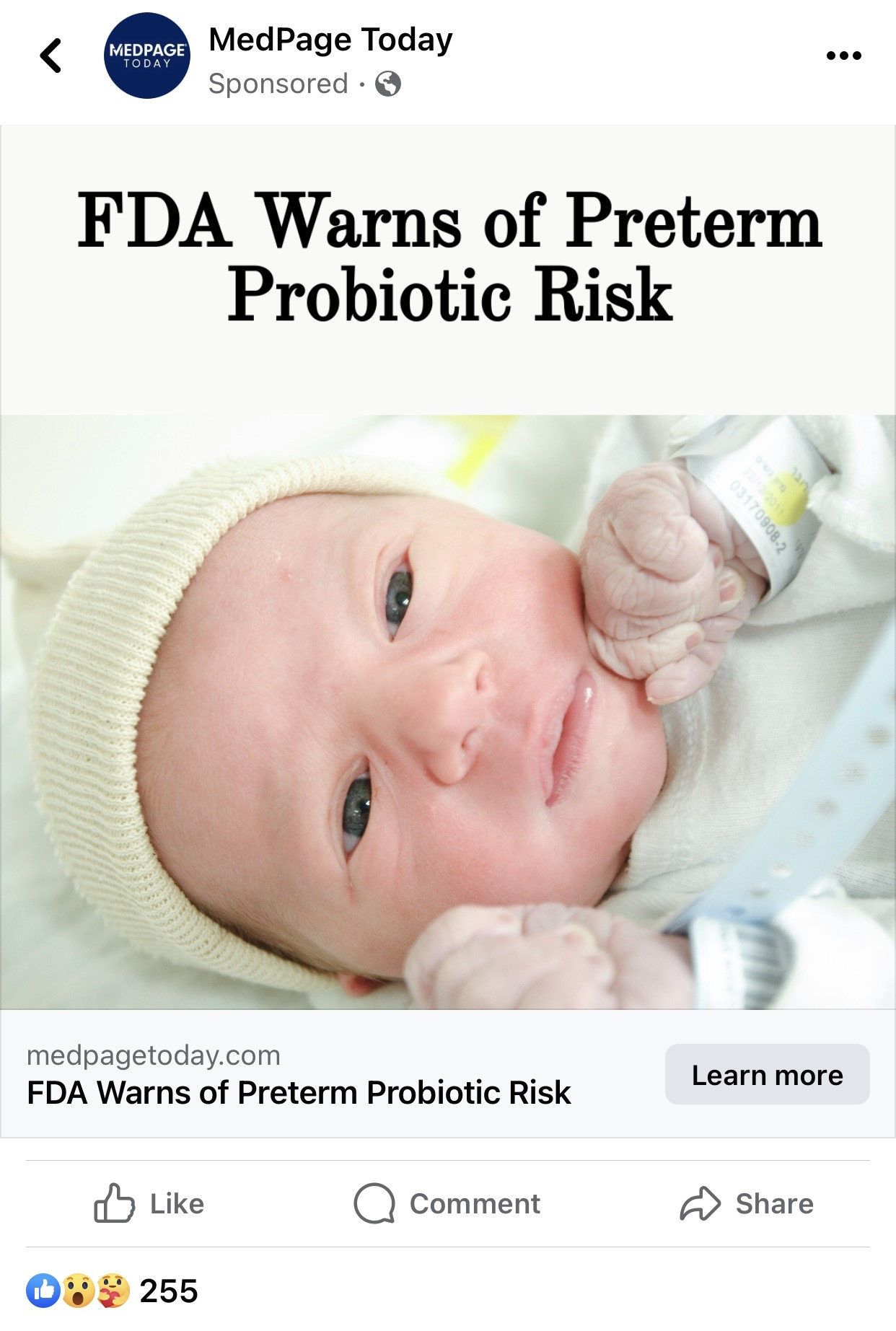

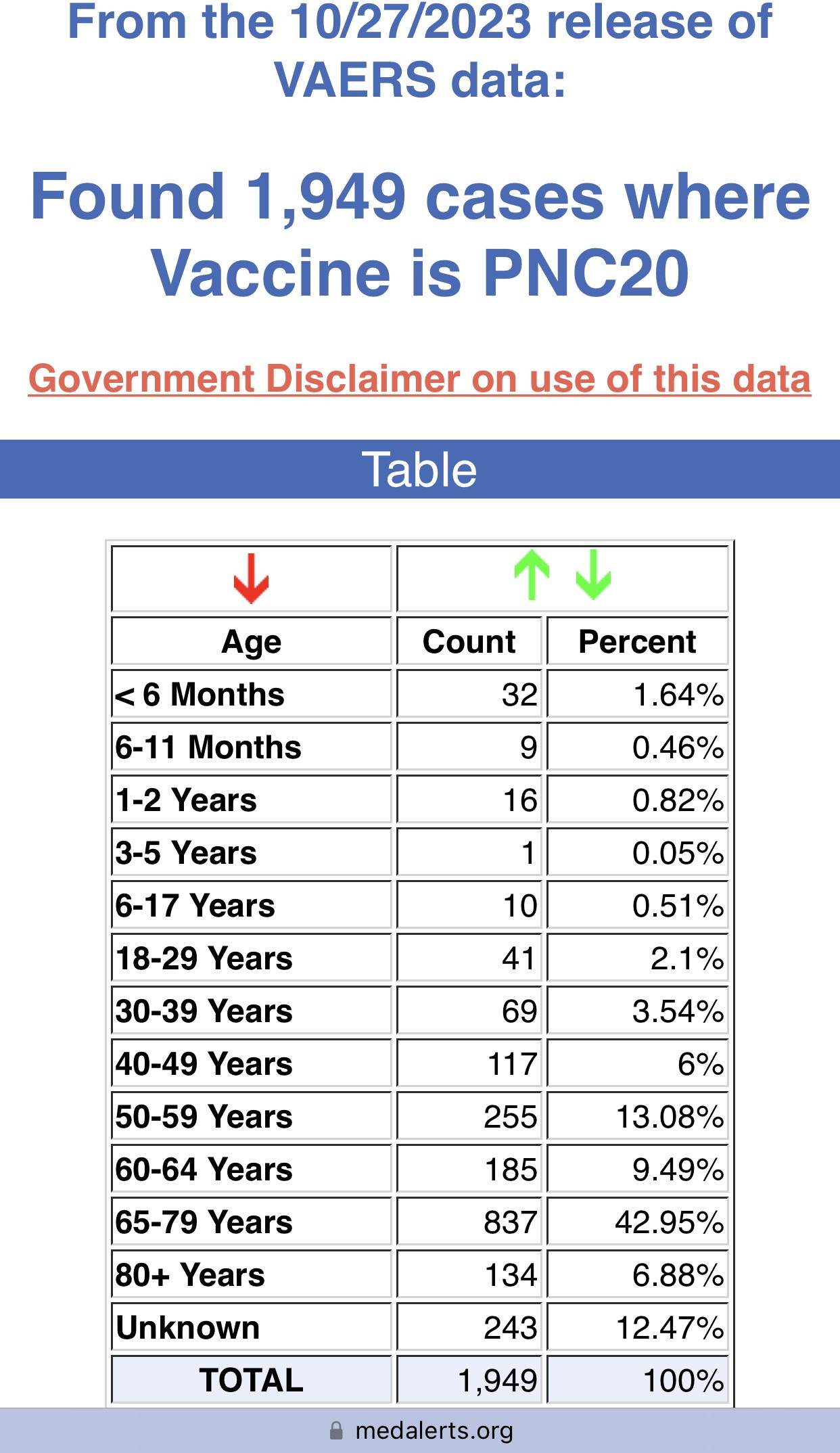
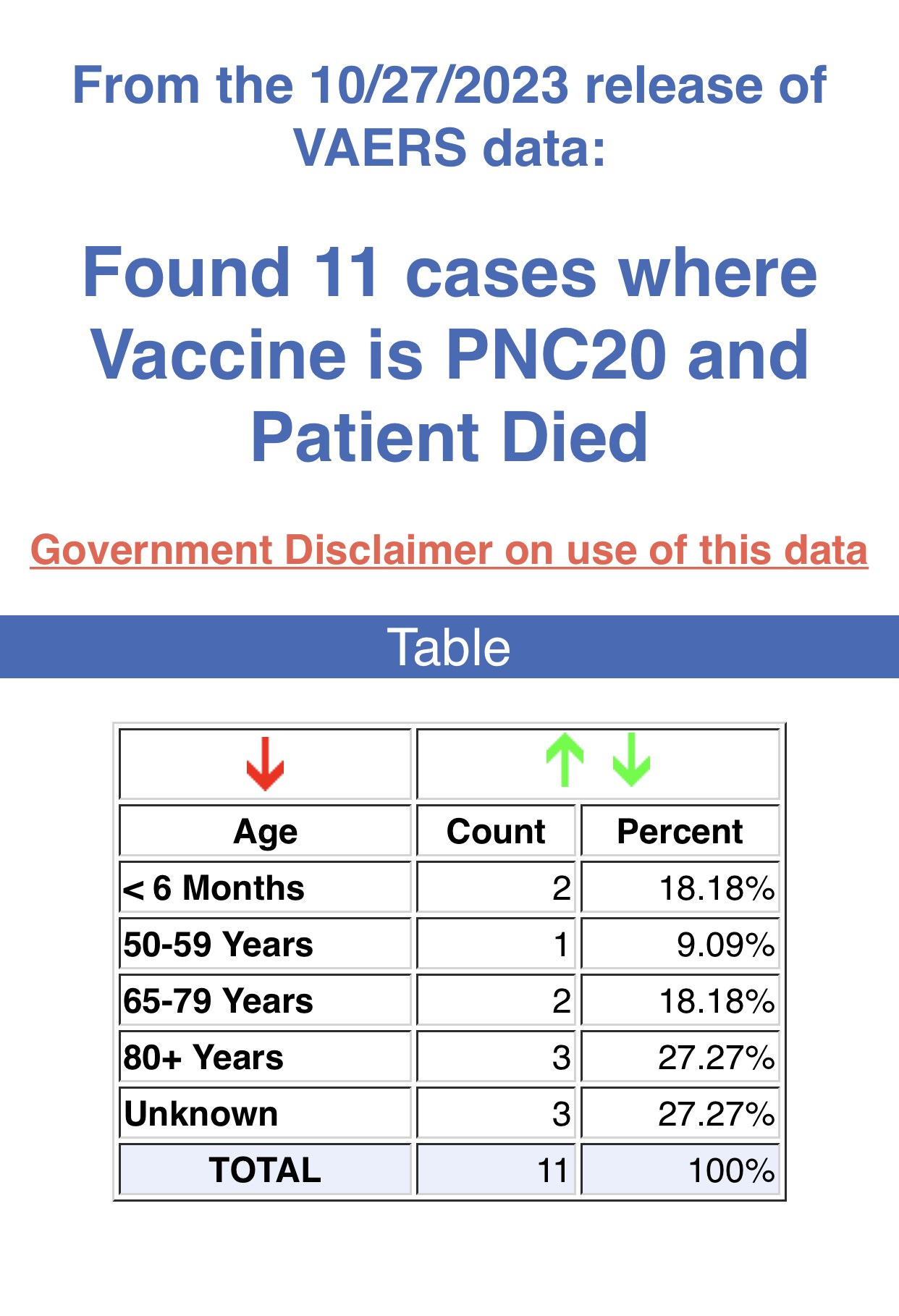
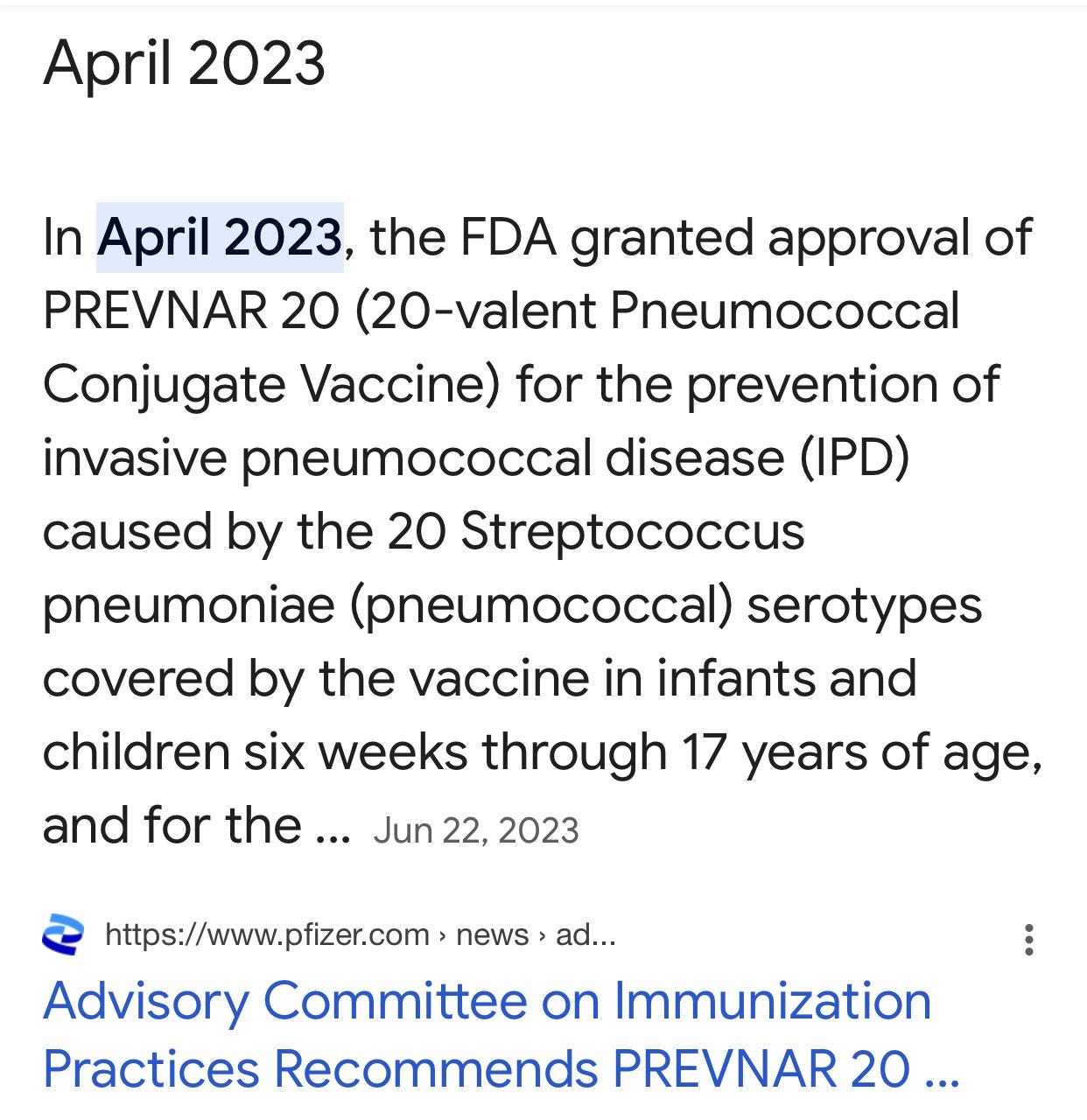


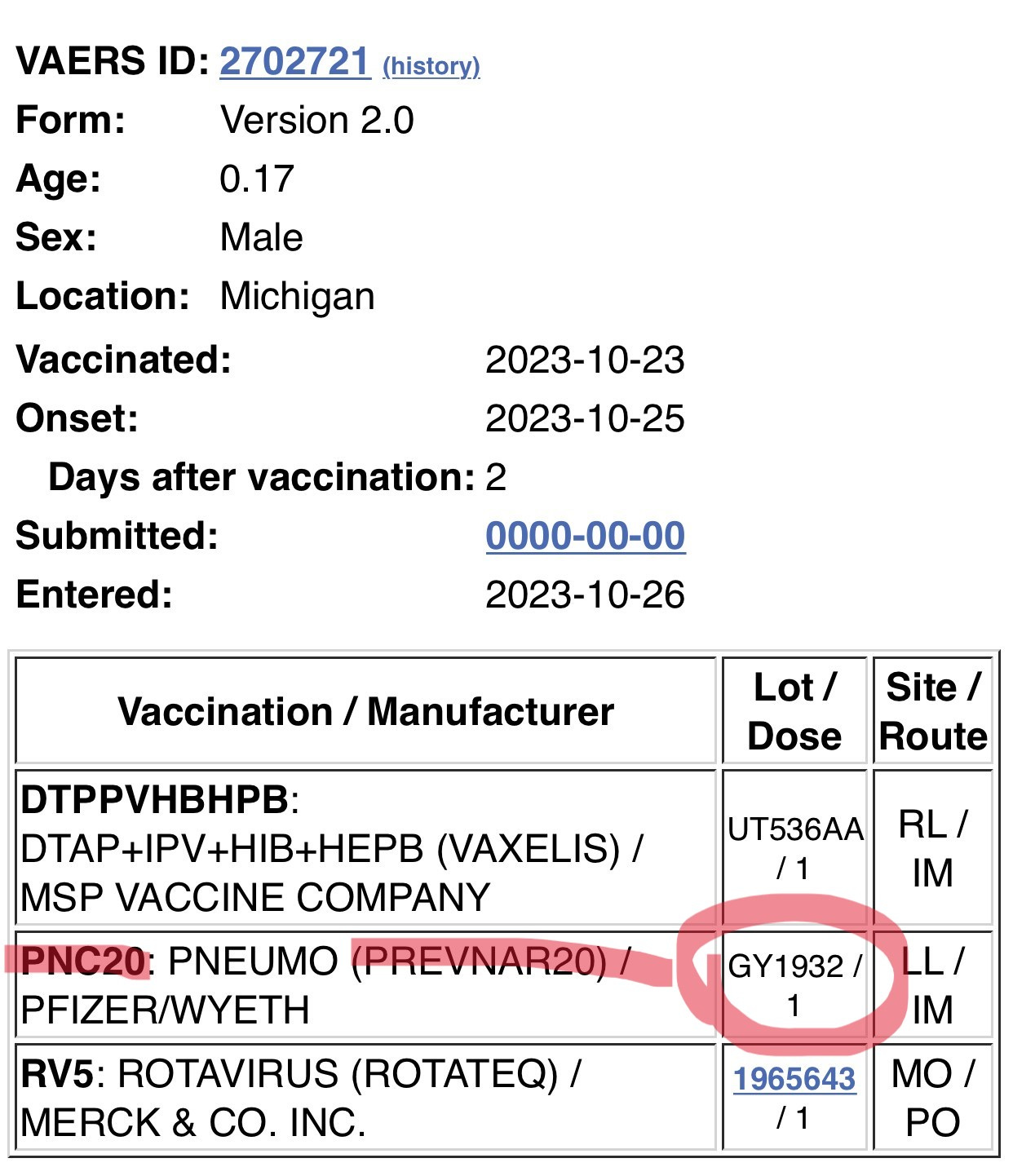
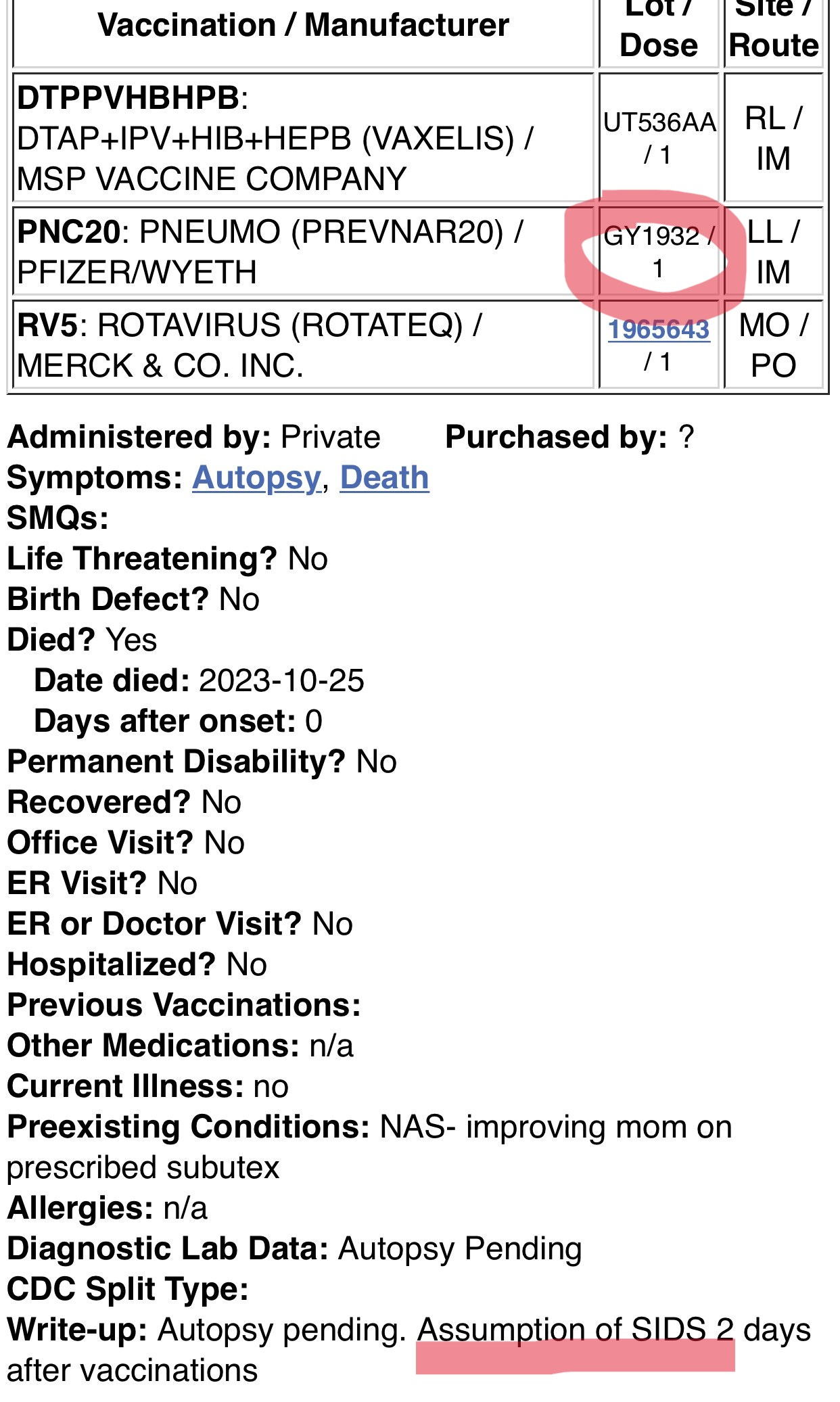

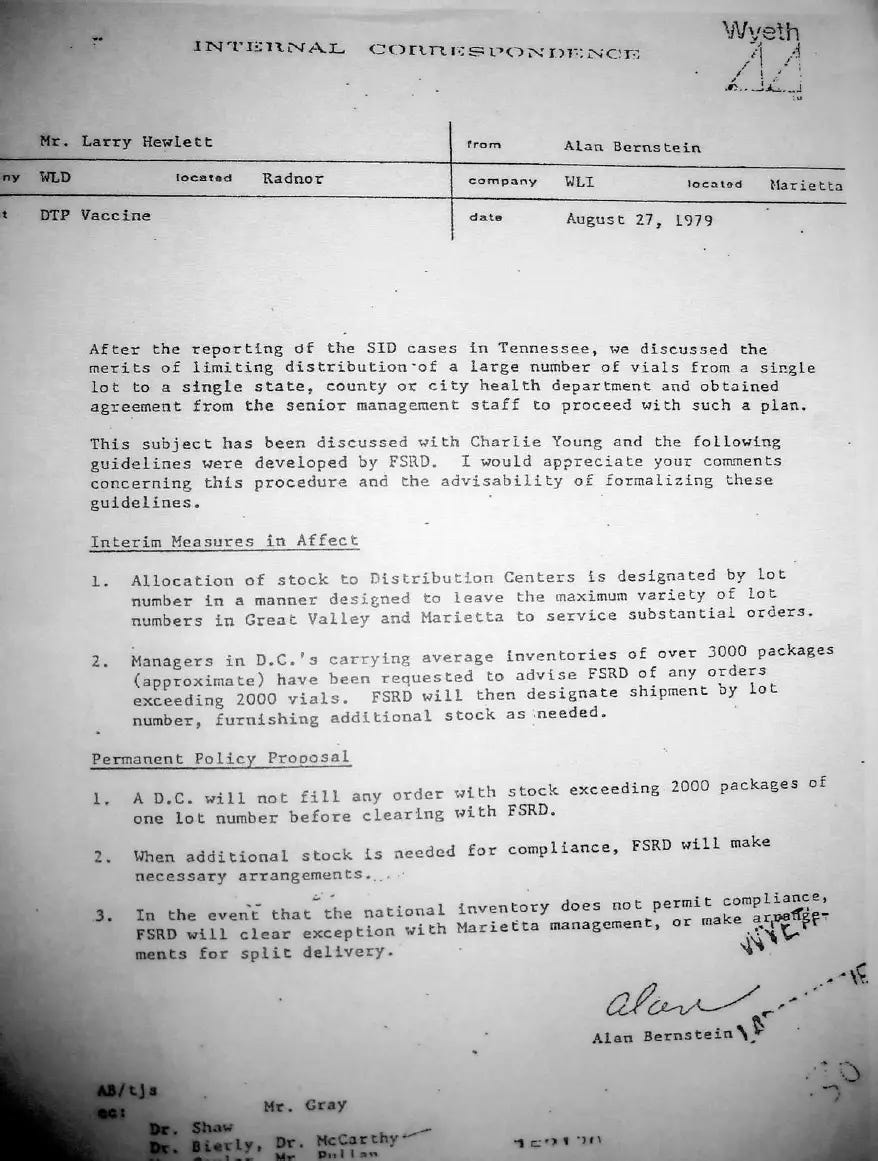
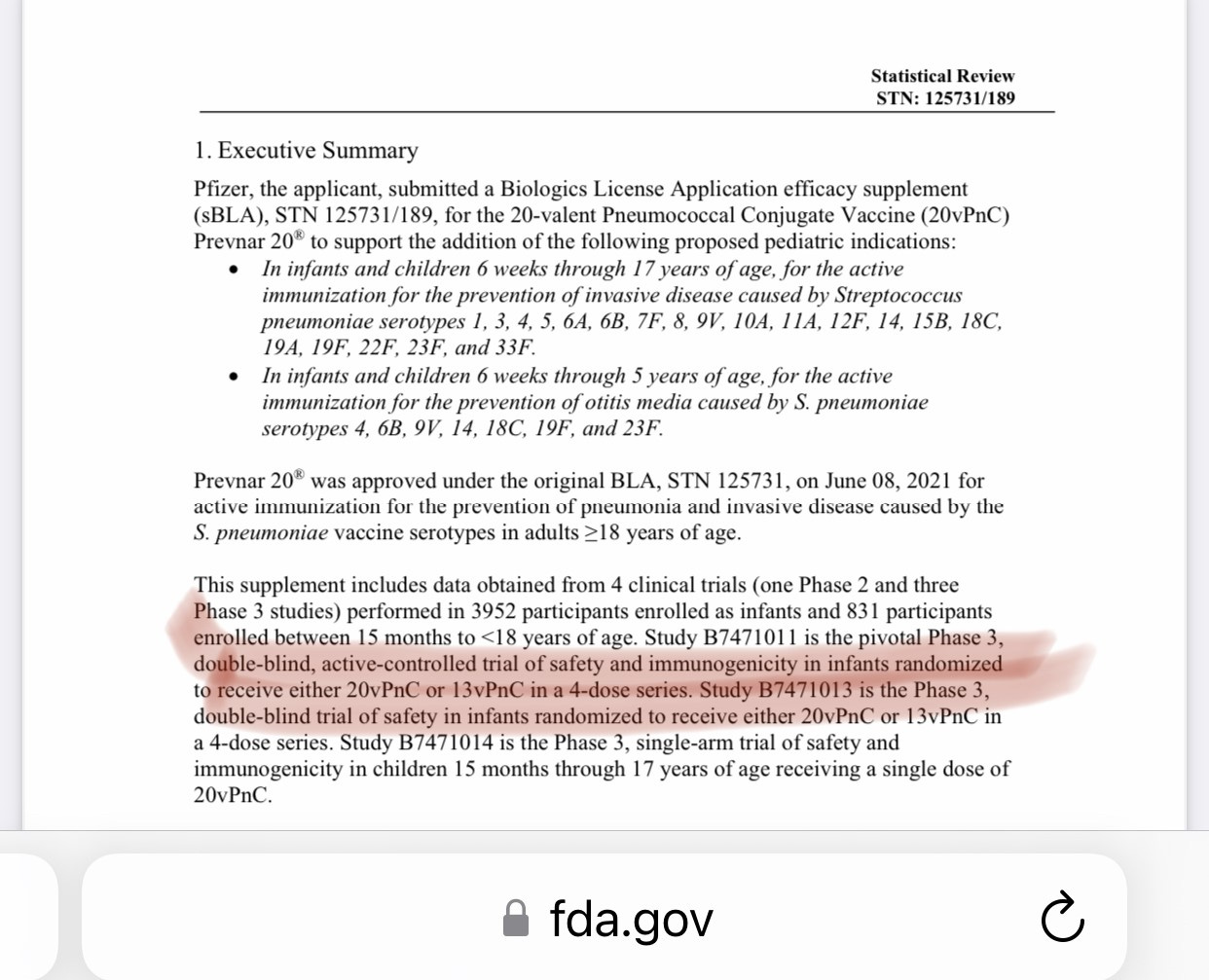

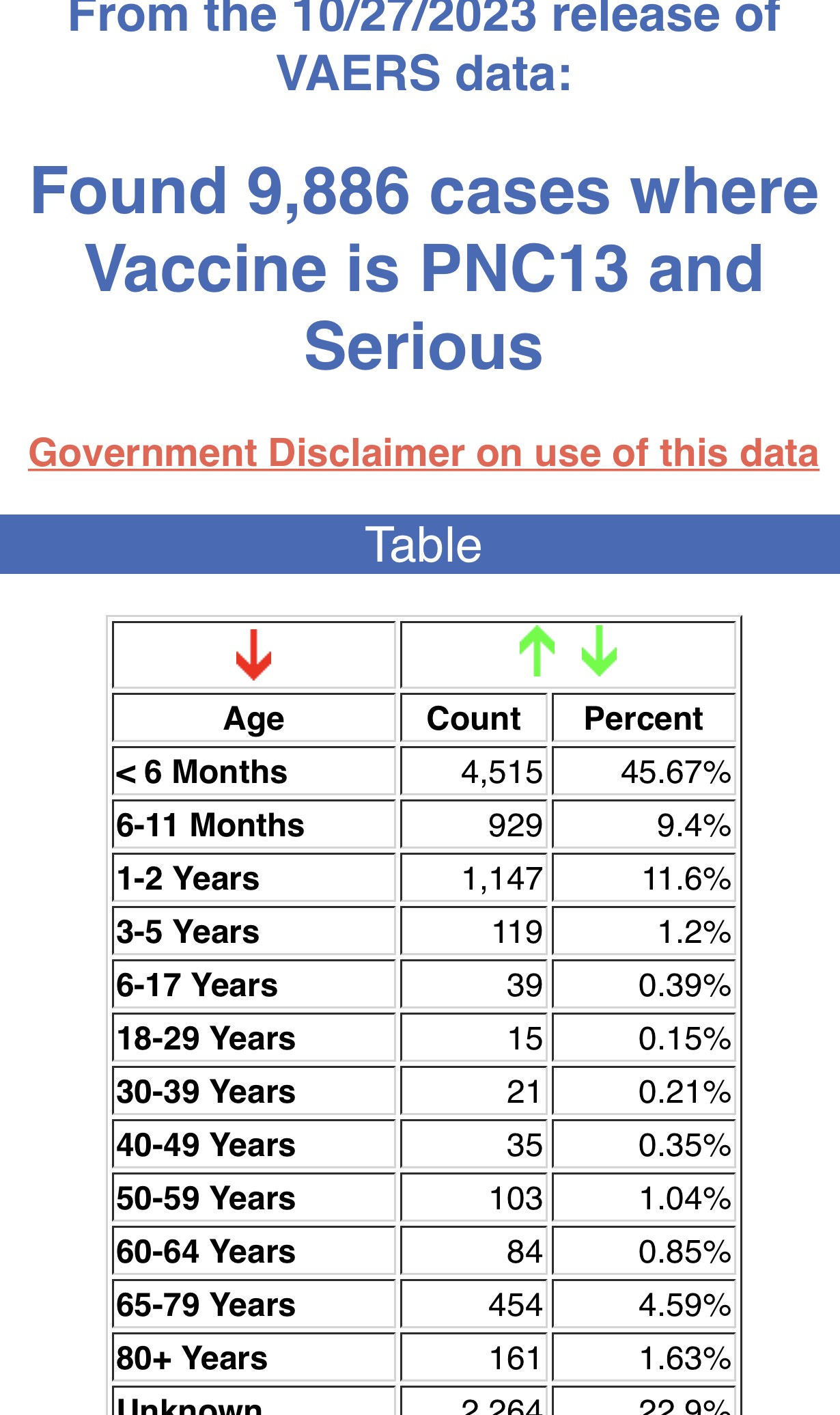

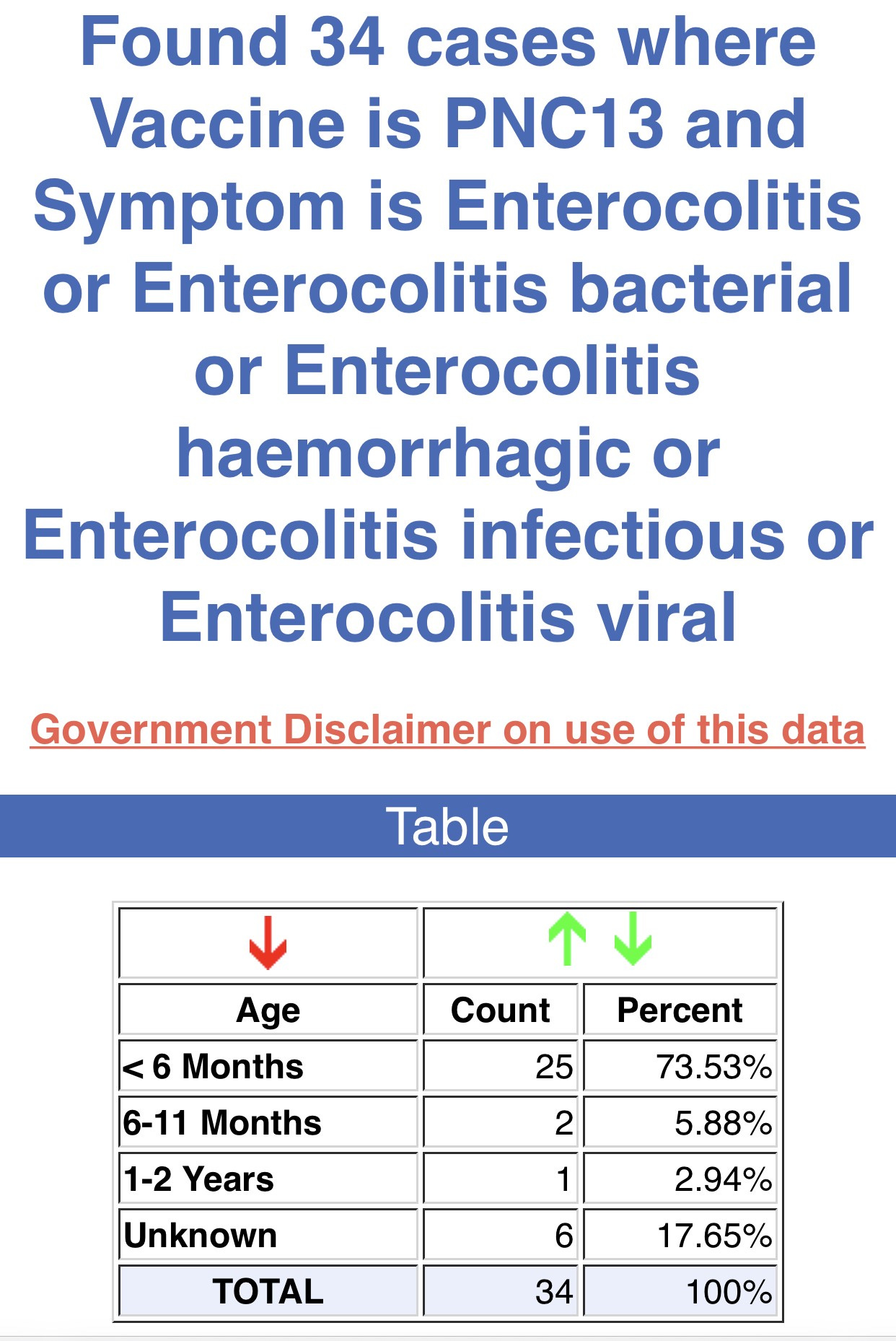
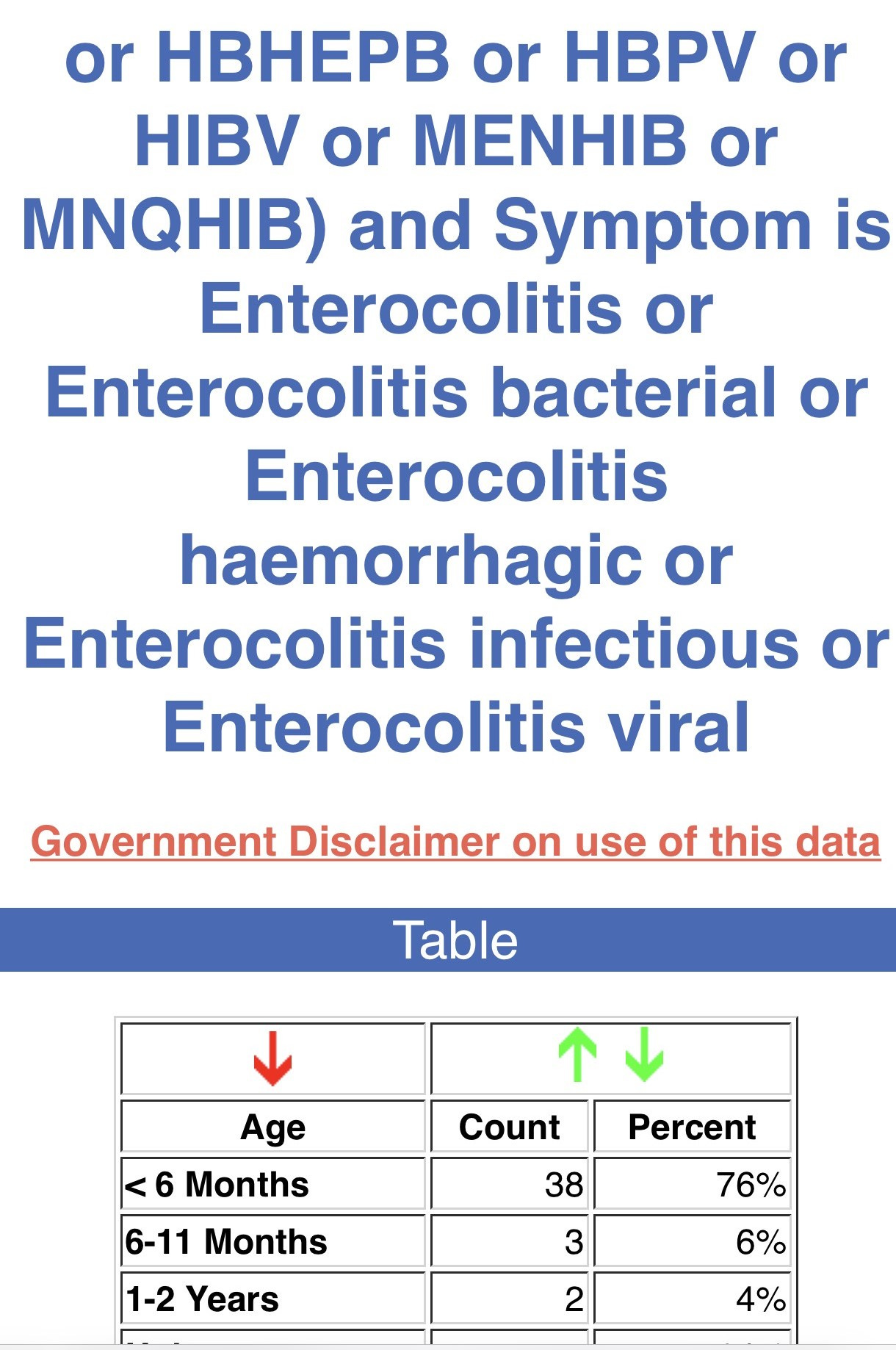

NEC Baby Formula Lawsuit
https://www.drugwatch.com/baby-formula/lawsuits/
Good grief! Thanks for the information. They always blame the thing that could help vs. looking at all the other contributing factors.